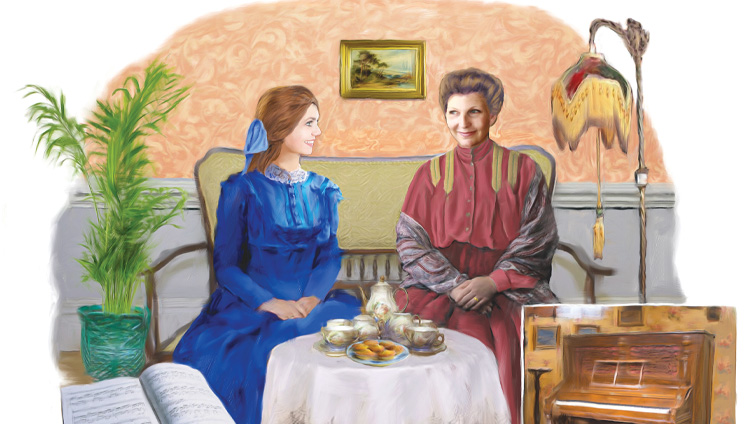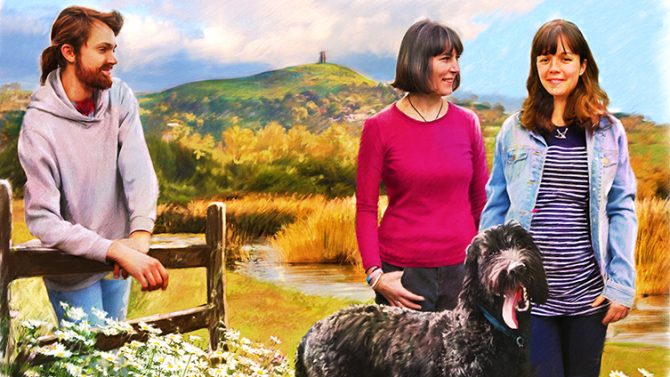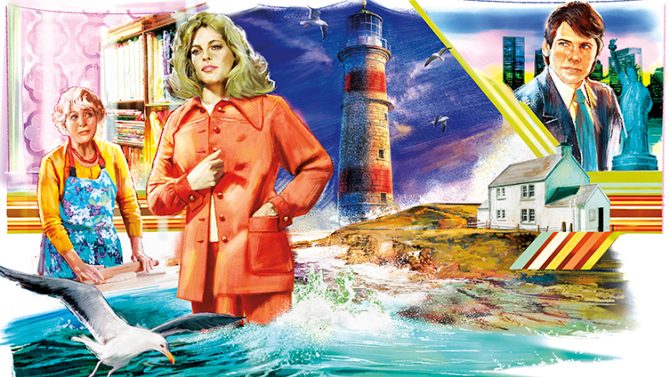Perfectly In Tune
Norah's piano lessons were important to her, but Mama would not approve...

Illustration: Pat Gregory.
Subscribe to The People’s Friend! Click here
Norah's piano lessons were important to her, but Mama would not approve...

Illustration: Pat Gregory.
HISTORICAL SHORT STORY BY BECCA ROBIN
In this story, set in 1910, Norah’s piano lessons were important to her, but Mama would not approve…
It had snowed overnight and was starting to do so again. Snow on snow, just like in the hymn fifteen-year-old Norah had been learning to play.
She gazed out of the window at a silent white world with all possibilities frozen.
The children had been sent home early from school yesterday.
It remained closed today, so there would be no opportunity for Norah to call at Aunt May’s house for the piano lesson no-one at home knew anything about.
Norah was a pupil-teacher in the junior room at school, and always left early on a Wednesday afternoon for this purpose.
Chaos descended over the breakfast table when Norah’s little sister, Martha, let out a shriek.
“Mama, Joe’s dripped honey all over Dorothea!”
Blobs and trickles of honey clung to the ragdoll’s white pinafore.
“What’s Dorothea doing at the table, our Martha?
“And Joe, I’ve told you before, ask for the honey to be passed – don’t stretch across.” Their mother sounded harassed.
To make matters worse, being distracted, she nicked her finger with the knife with which she’d been cutting up the children’s bacon.
Joe stuck out his tongue at Martha, who began to wail.
With a sigh, their father came out from behind yesterday’s newspaper and insisted Joe apologise to his twin sister.
Meanwhile, Norah took Dorothea to the sink to clean off the honey.
“You’ll have to take charge of these two today,” Norah’s mother called over crossly.
“I’ve work to do. I can’t have you all under my feet.”
“Yes, Mama,” Norah agreed, wondering how she was supposed to keep the squabbling six-year-olds occupied.
In the end, it didn’t prove too difficult.
The sight of falling snow seemed to calm the children, and they were soon playing contentedly on the parlour floor.
Joe was choo-chooing his train round the legs of the furniture, tolerating Dorothea as a pretend station master who lived in the little house Martha had built from cushions.
With no real trains running that day, Papa, who was a real station master, kept Mama company in the kitchen.
Norah’s older brother James, a railway porter, was clearing pathways around the house, having begun with the most important one down to the privy early that morning.
The sternly ticking mantel clock chimed the half hour.
Half past ten. Norah’s eyes kept returning to the old walnut-cased upright piano standing mute against the wall.
Mama, who didn’t play, had inherited it from her own mother.
On the rare occasion she had the house to herself, Norah would take the sheet music she had hidden in her room and practise her favourite pieces.
The station master’s house had no immediate neighbours and was far enough away from Lunfield Station for the sound not to be heard, which was just as well as the piano was horribly out of tune.
“What are you doing, our Norah?” Martha was looking at her curiously.
Norah stopped playing a silent version of “In The Bleak Midwinter” on an imaginary keyboard in her lap.
She folded her arms.
“Nothing.”
“Dorothea’s hungry.” Martha changed tack.
“Is she? All right, then. Who wants toast?”
The twins shuffled forwards, clasping their hands together and looking at her in the pleading fashion that always made her laugh.
After checking with her mother that it wasn’t too near lunchtime, Norah returned with some thick slices of bread, the butter dish and knife.
After warning the children not to sit too close, she took the spark guard away from the fire, skewered the first slice of bread on the prongs of the brass toasting fork and held it to the flames.
The twins sat patiently on the hearthrug, waiting for the crackling flames to turn the bread a lovely golden-brown.
Afterwards, they returned to their game while Norah remained by the fireside, lost in thought. May wasn’t her real aunt. She was her mother’s first cousin, but Norah had always called her Aunt May.
Mama and May had never fallen out, but they hadn’t spoken properly in years.
Norah knew Mama would hate the idea of her cousin giving Norah these lessons.
I won’t take charity from May,
she could imagine her saying.
Orphaned as a child, May had been taken in by Norah’s grandparents and raised alongside Norah’s mother Eleanor.
Both girls received piano lessons, but while May excelled, Mama had shown no interest.
In those days, May was the one needing charity. How times had changed.
Now she owned her own magnificent grand piano in the house on Beech Lane where she lived with her solicitor husband.
Perhaps because they didn’t have children of their own, May always seemed delighted when Norah called round.
Norah knew it made May uneasy, giving her the piano lessons, but at the same time, she said she’d do anything to nurture Norah’s musical talent.
If it got her into trouble with Mama, she’d cross that bridge when she came to it.
It took days for the snow to clear sufficiently for life to start getting back to normal.
When Wednesday afternoon finally came around, and the clock on the classroom wall chimed two, Norah was delighted to pack up her belongings.
She headed for Beech Lane, still having to pick up her skirts to avoid melting mounds of slush along the pavements.
When she arrived, Aunt May greeted Norah affectionately as ever, but she had a bad cough.
In the music room, the two of them took their accustomed places side by side at the piano.
Dilly the maid brought a pot of tea and a plate of dainty queen cakes, which she placed on the small table beside them.
“That’s a nasty cough you have, Aunt May,” Norah observed.
“I’ll shake it off in a few days.” Her aunt smiled weakly.
Norah played “In The Bleak Midwinter” and other hymns.
Aunt May played the organ at St Saviour’s each Sunday and Norah loved these tunes.
Sometimes Norah would play them on the small harmonium leaning against the wall of the music room, which went some way towards recreating the sound of the pipe organ in church.
She was proficient in pedalling the foot-operated bellows, and May said that, one day, it would be lovely if she could start playing in church.
Lovely, yes, Norah thought, though quite how she’d manage it without revealing her secret to Mama was something else.
After playing the hymns, Norah returned to some old favourites, like “Für Elise” by Beethoven.
When she played, Aunt May sat smiling with her eyes closed as though carried away on a gently flowing stream.
She couldn’t help but feel a little guilty at the pleasure she took from visiting the house on Beech Lane, which was so different from her own noisy, crowded home.
Everything about it was gentle and quiet, even the tick of the clock, although today this made her poor aunt’s persistent cough all the more apparent.
Afraid of overtiring May, Norah made an excuse to leave early, thanking her for the lesson and saying she hoped she’d be better soon.
Upon parting in the hallway, May clasped Norah’s hands between her own.
“I do love to see you, my dear.” May smiled wistfully.
“You’re the image of dear Eleanor when she was young. She is so often in my thoughts.”
“Mama’s always so busy at home.”
Although this was true, it seemed a feeble excuse for why her mother should want to keep away from May.
Knowing Mama well, May could probably guess the real reason: that she was stung by the difference in their perceived social status.
Mama had never visited the house on Beech Lane, despite many invitations over the years, and had never invited May to their house.
A curt greeting after church on Sunday was the extent of the cousins’ interactions.
If only Mama could bury her pride, Norah thought to herself.
Family was so precious. She imagined that somewhere deep in her mother’s heart, she still longed for the friend and companion of her youth.
But if only Norah could have picked a better time to raise the subject.
That evening, her mother descended the stairs having put the twins to bed and plonked herself in the old stick chair by the kitchen fire.
Norah, who had just washed up the supper things, brought her tea.
“Thank you.” Mama heaved a sigh as though the cup of tea marked the finishing line at the end of the race she’d run that day.
Norah sat opposite and got out her needlework box. Papa’s socks needed darning.
“I saw Aunt May today,” she said, adding quickly, “in the street.”
The first part of what she’d said was true, at least.
“Did you?” Mama’s response was more a statement than a question.
“She was asking after you.”
“Was she?”
“Mama, wouldn’t it be nice to invite her here? I could bake a cake.”
Her mother looked at her incredulously.
“May come here, to sniff round the place and look down her nose at us? I should think not.”
“You know she’s not like that, Mama. You two could be such good friends, just like when you were young.”
Her mother looked pained.
“That was a long time ago,” she muttered. “I’m sure May has plenty of friends with nothing to do but swan around.
“Now, leave me be. I’m tired. This is the last thing I want to talk about.”
Norah was sorry for upsetting her mother.
She got on quietly with her darning, but every now and then glanced up at Mama, who continued to stare into the fire, seemingly lost in thought.
When Norah entered St Saviour’s with her family the following Sunday morning and saw the empty organist’s seat, she knew there must be something wrong.
When Reverend Boyce rose to speak, he confirmed her fears.
“Before we start the service, I have sad news to impart. Today we will be praying for our dear sister, May Forrest, who is gravely ill.
“Her husband sent word this morning that she would not be in her usual place at the organ . . .”
Upon hearing these words, Mama clutched Norah’s arm with a trembling hand.
Then she heard her whisper to Papa.
I must go to her after the service.
Norah couldn’t concentrate on what the vicar was saying as the service began.
She kept thinking about Aunt May the last time she’d seen her and the wistful smile as she’d spoken of Mama.
How could she have become so very ill in such a short space of time?
Had she started feeling worse that same day?
Norah would insist on accompanying her mother to the house on Beech Lane after church.
She wondered if it would do May good to hear her play the piano.
If so, surely that was more important than worrying about revealing her secret to Mama.
In their pew, the whole family knelt to pray. Norah closed her eyes and clasped her hands fervently.
An image of Aunt May came to her, kind and welcoming as always.
Without her, Norah would never have learned the skill that gave her so much pleasure.
Without her. What terrible words those were.
Norah could not imagine life without the dear person who had always been so encouraging.
The Reverend Boyce announced the hymn number that Norah recognised as “In The Bleak Midwinter”.
Today there would be no organ accompaniment, unless . . .
Afterwards, Norah would wonder how she’d been brave enough to do what she did in front of everyone, and Mama in particular.
The image of May must have bolstered her up.
It felt like she was honouring her aunt to take her place at the organ. Nothing else seemed important.
Norah stepped into the aisle and walked to where Reverend Boyce stood.
After she whispered something to him, he signalled to Mr Hardy the verger, whose job it was to operate the bellows.
Norah didn’t look round at anyone, she simply sat at the organ, turned to the correct page and waited.
As soon as she heard air filling the instrument, she played the introduction and the congregation stood.
With one voice, they sang about the earth standing hard as iron and the water like a stone – words that seemed to sum up the harshness and beauty of the outside world, which had frozen again overnight.
When it was over, the sermon began.
Norah remained at the organ, ready for the next hymn, and all the time reminding herself that she was playing for Aunt May.
As soon as the service was over, Norah and her mother hurried side by side along the pavement in the face of a biting wind.
“How long has she been giving you lessons?” Mama had guessed the reason for Norah’s astonishing skill, which had been unveiled in such a public way.
There was no hint of annoyance or even hurt in her voice.
She spoke quietly and walked purposefully.
“For the best part of two years, Mama. I am sorry.
So many times I’ve wanted to tell you. I hated keeping it from you.
“I probably would have put a stop to it . . . and what a shame that would have been,” Mama replied.
“You play beautifully, child.”
Norah didn’t know what to say. The midwinter wind seemed to strip away all possible objections from her mother.
Only the sad, stark truth of the situation was left to be acknowledged.
“How kind poor May has been, and how foolish I have been.”
A tear blew raggedly across her mother’s cheek. Norah took her arm to offer her comfort.
“We all love you so much, Mama. You work so hard and look after us all so well. Please don’t go upsetting yourself.”
“I just hope she has the strength to see me, and it’s not too late.
I want to ask her forgiveness for my coldness all these years.
Edwin was surprised to see them both and invited them in.
The doctor was upstairs with May, so they were shown into the music room, where Dilly brought them tea while they waited.
Ten minutes later, the tea remained untouched.
They heard low voices in the hallway and strained to listen.
Then the front door opened and closed.
Edwin appeared in the doorway, looking pale.
“It’s probably best just one of you goes to see her,” he said. “A short visit.”
Mama rose to her feet.
“Do you think Aunt May would like to hear me play ‘Für Elise’?” Norah asked.
“I think she’d like that very much. I will leave the door open so she will be able to hear.”
The sheet music was still on the piano from the previous Wednesday.
Norah began to play and hoped the melody was flowing through Aunt May’s room like a stream of healing water.
She went from one to another of their favourite pieces until she felt Mama’s hand on her shoulder.
“How is Aunt May?” Norah asked.
“Too weak and tired to say much,” Mama said. “But she seemed pleased to see me.
“She smiled when you began to play. Edwin has asked if we will call again tomorrow.”
The next day after school, Norah met Mama at the end of Beech Lane and they walked together to May and Edwin’s house.
They did the same every day that week, not stopping long, but long enough for Mama’s companionship and Norah’s playing to start putting the colour back into May’s cheeks.
By the following Sunday, the doctor confirmed that his patient was out of danger.
It had been one of the hardest winters anyone could remember, but the first snowdrops appeared, then the crocuses and other early signs of spring.
The moment they had all longed for arrived one Sunday afternoon, when Uncle Edwin drove Aunt May to the station master’s house for tea.
The whole family gathered around the table, at which Mama had laid out a magnificent spread, including a cake baked by Norah.
Everyone was in a good mood, with Mama and May reminiscing freely about when they were young.
“There’s our old piano,” May cried.
“Think of the hours we spent sitting before it, Eleanor.”
“Well, you did.” Mama chuckled, turning to Edwin to explain.
“Poor May had to learn my pieces as well as her own.
“She’d play them so my mother listening through the wall would think I was improving.
“Meanwhile, there was I in the window-seat, reading the latest novel.”
“Did you get in trouble when she found out, Mama?” Joe asked.
“She never did,” Mama said guiltily. “Before long I asked if I could stop having lessons.
“May was always the one with musical talent, and now it’s come out in our girl, too.”
“Will you play for us, Norah?” Edwin asked.
Ever since letting the cat out of the bag, Norah hadn’t so much as raised the lid of the old walnut-cased piano.
It was so out of tune, she wouldn’t have willingly inflicted its awful sound on anyone else.
“Yes, why don’t you play for us?” Aunt May urged.
Norah had noticed earlier how she had brought several of her music books.
Mama reached over and patted her daughter’s hand.
“Do play for us.” The twinkle in her eye raised Norah’s hopes.
Norah took “Für Elise”, settled herself at the piano, raised the lid and played the opening bars.
Beautiful sounds filled the room, the like of which she had never imagined the old piano capable.
She stopped playing and spun round.
“It’s been tuned!”
The merriment on the adults’ faces revealed the secret they must have been hugging to themselves for days.
“I’m looking forward to our house being filled with music,” Mama said.
She and May were holding hands.
Norah realised that, although long years may pass, some bonds are made never to be broken.
Never miss an issue ‘The People’s Friend’ packed with even more stories on sale every Wednesday.

Paula Williams

Deborah Siepmann


Alison Carter


Teresa Ashby

Beth Watson

Alyson Hilbourne

Katie Ashmore

Kate Hogan

Liz Filleul

Beth Watson